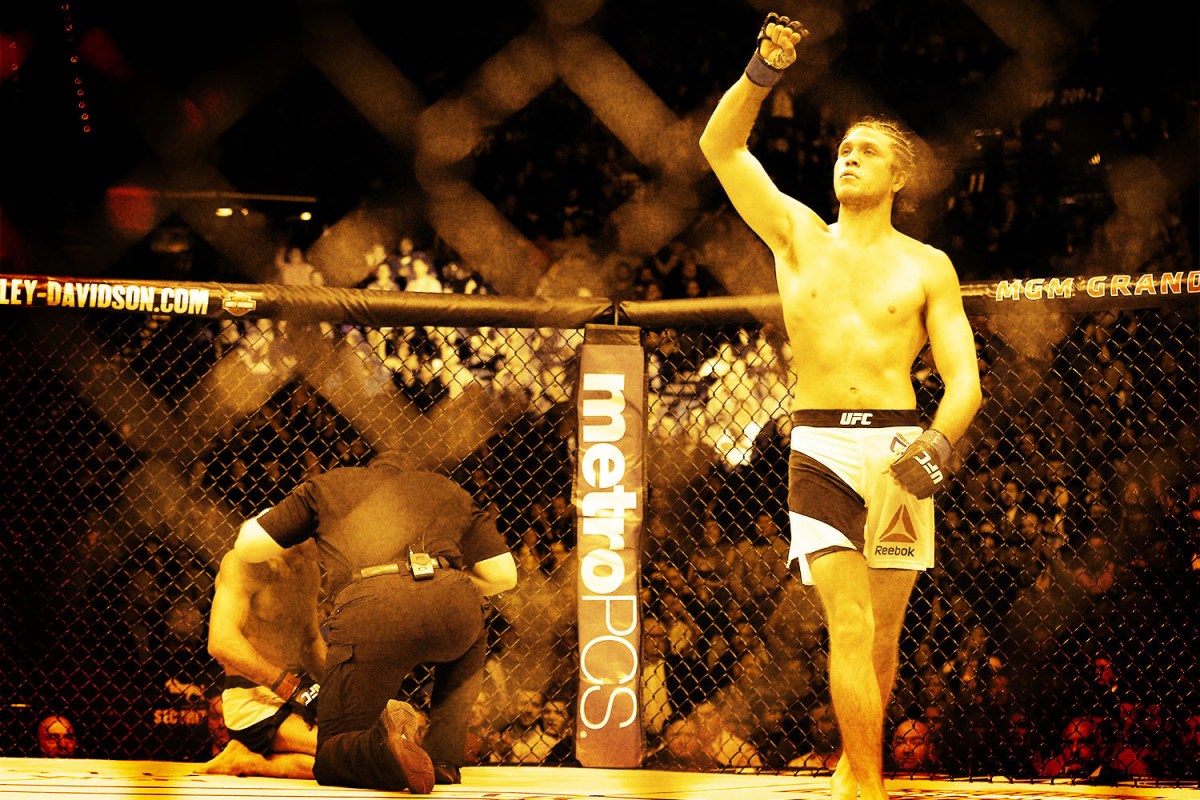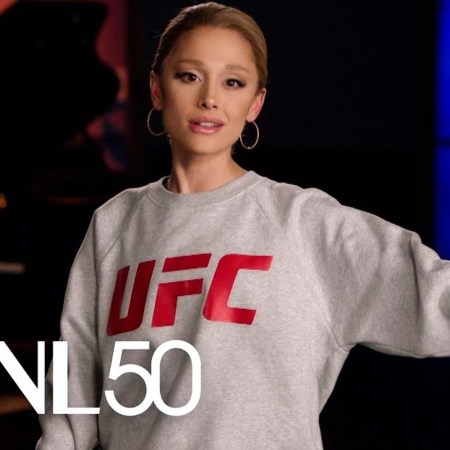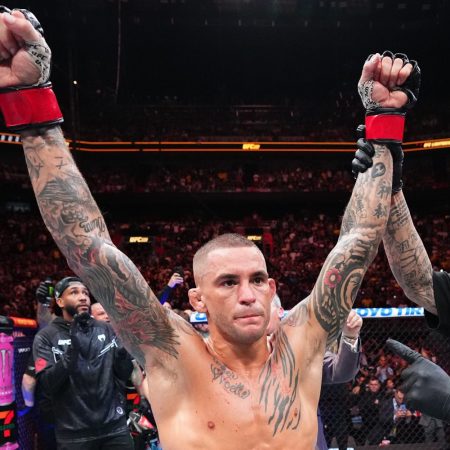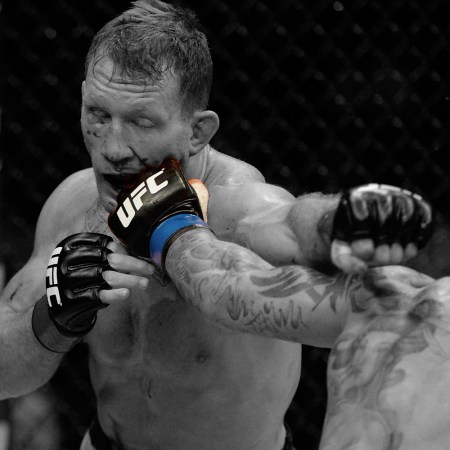Brian Ortega has one of the more moving stories in mixed martial arts.
Growing up in the projects of Los Angeles, he started learning kickboxing at the age of five. He trained in Brazilian jiu-jitsu at the legendary Gracie Academy under chief instructor Rener Gracie, and started his fighting career by winning illegal cage matches as a teenager. In 2014, he made his debut in UFC’s featherweight division and quickly rose up the ranks; he was undefeated in his first six matches through explosive strikes or vice-like chokes en route to becoming a fan favorite.
Despite a freak loss when Ortega dislocated his shoulder during the UFC Long Island main event, he’s still ranked third in the division and his story is far from over. We spoke with the 31-year-old fighter on his journey into mixed martial arts, finding motivation in family and thriving though adversity.
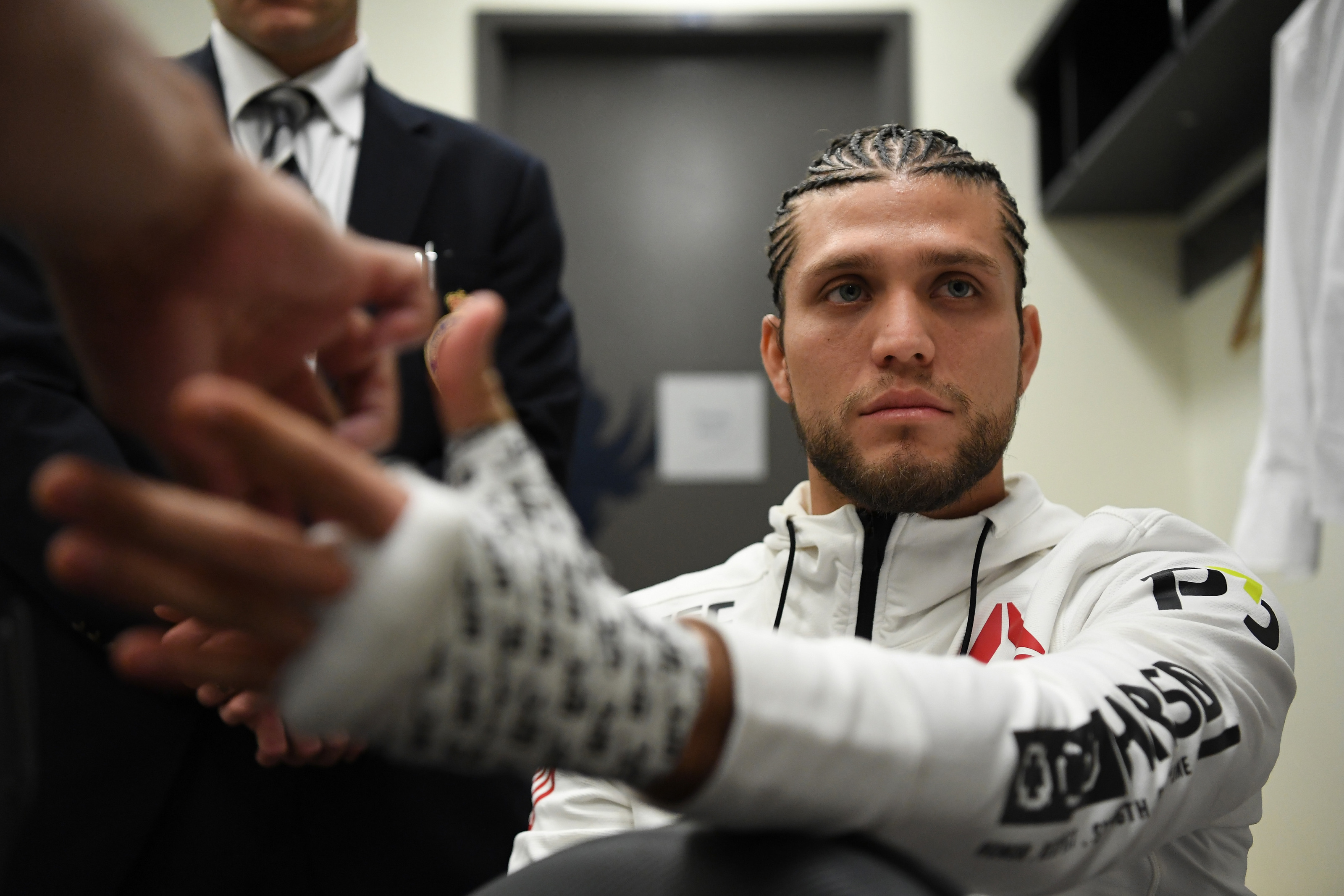
How did you find your way into the world of mixed martial arts?
Ultimately what brought me to martial arts was my father. He started me young and it’s always been my dad behind me, and in my corner. I can imagine for my father, he was hoping that I would find a sport that I loved and that I would find a passion for. I feel like I was able to do that with mixed martial arts. But to be clear, it wasn’t for him only, I also fell in love with it. My entire life has been about the fighting game, I never have had what you would call a “regular job.” I never knew anything else. The first time I was making money it was from teaching jiu-jitsu at the age of 16.
What was it like stepping onto the mat across from another person in your first real fights?
My dad signed me up for my first illegal cage fight when I was 15 years old. He told the organizers that I was 18 and we had no gloves or anything like that. I weighed 124 pounds and the guy I was fighting weighed 155. I was scared shitless going in to it, but I ended up getting the win. The entire crowd erupted cheering for me and I could see my father in the back of the room and he gave me this little head nod. That meant everything to me because when I’d been fighting I wasn’t able to see him and it was in the back of my mind, “Where is he at?” He was there the whole time and gave me this little half smile like, “Fuck yeah.”
Back when I was just beginning my training journey he would drop me off at my jiu jitsu tournaments because he had to work. I was in high school still. I would run in to get the waiver so that he could sign it for me and give me money for the entry fee. Once that was all taken care of he would leave and tell me that he’d be back to pick me up after his shift. I would do my four or five matches, win the whole thing, and have nobody to really celebrate it with in that moment. I would just wait outside when everybody was gone and the place was locked up. I had no cellphone or anything like that. I’d be walking around with my shirt off and my medal around my neck. I would put the medal in my pocket when I saw his car, and tell him that I lost.
How did he react when you told him you won?
There was no emotion from him whether I won or I lost, which was good for me. I think it’s only natural to want to please your parents, but the fact that he was pleased no matter what gave me freedom. And it gave me the ability to fully own every victory I got. I could never keep the secret very long though on the rides back though, we’d drive maybe five minutes and I couldn’t help but bring out the first place medal. He would tell me that I was the best in the world, and in those moments I believed that I was the best in the world.
Do you remember a time when that energy and those moments help you push through adversity on the mat?
I was fighting for my first title in a competition called Respect in The Cage at 20 years old, and I dislocated my shoulder in the fourth round. I fought through the rest of the fourth round and then after I was debating whether or not to go into the fifth round. I couldn’t feel my arm and the guy was still tough in those later rounds. I was tired as shit, because it was the first time that I had ever done five rounds in my life. I had been winning the whole fight going into that fourth round, so it was a tough spot. I knew that I would be going in at a serious disadvantage into that last round without being able to use my arm, he was probably going to beat me up bad, and the guys in my corner were freaking out. My head was down and I was really starting to question whether I should continue. I caught my father’s eyes and I don’t know how he got there because he didn’t have a front row ticket, somehow he made it all the way to the cage. This guy who never really showed emotion or express himself that often looked really concerned. That is when I gave the head nod back to him to express to him that he didn’t have to worry and that I had it. In that moment I took the lead of my destiny. I fought that fifth round, almost knocked the guy out with one arm, and I won.
Once the stakes got bigger, and the training camps got longer, how did you find your motivation?
The beautiful thing about motivation is it can be pulled from a lot of different places. For the longest time my motivation was pulled from my pain, my anger, the things I went through and the things I saw. The anger. It was fueled by a lot of wrongs that happened to me in my life.
I got out of that situation, and I started to heal myself slowly. I didn’t know where to get my motivation from after that initially. I didn’t live in the ghetto anymore. I had to start a new quest on where I was going to find that motivation and that quest began online finding quotes from people like The Rock on YouTube. I would listen to those videos over and over again, then go Google motivational quotes. That fueled me for a few fights. But now my motivation is the future. My motivation is what can I do to provide and succeed for my family. I have discovered there is no limit to what I’m prepared to do for them. I will kill myself for them to have a better life.
There are moments when we lose our drive. The only thing that I think that we all struggle with is staying disciplined and staying consistent. Going when you don’t feel like going. These days I’m helped by the fact that my girlfriend is in my training sessions. It’s not like she’s just handing me a water either, even though that’s great, but she’s a fighter as well so she can get on the mat and teach me something. My kids are there too. They are watching my sparring sessions too, so they are seeing me hit people in the face and getting hit in the face. It feels more authentic to my life for me to train that way. This is what I do. I used to be very private with my family, and nobody knew that I had kids until recently because I was trying to protect them. Now I’ve gotten to the point where I’m comfortable with them being at my side at all times.
Do you have any training that you do with your kids at your side?
Every weekend we hit the track for a running workout and the whole family comes with me. The kids are playing soccer while I’m on the track running. I have some crazy hard cardio pushes that I do towards the end of those runs, lots of sprints. I called them over to the track and told them to try to race me. The youngest got a good head start, the oldest got a little bit of a head start, and I lost the first round. I genuinely tried to catch them and I could not catch them. They’re supposed to do everything that they can to stay ahead of me. They are little studs. I couldn’t help but get competitive with them, and it brought that side out of me again. I had to prove that I’m the alpha still, even though they are just eight and nine. It’s fun to have that kind of relationship with my kids and it’s a beautiful moment to share with them.
Can you explain how your fight style has evolved over the years?
I remember when I first started I wasn’t really going in there with a real plan. I would do drills and train, but there wasn’t a cemented strategy that I would follow. Nothing outside of getting the win that is. That’s why it would usually take me until that last round to get the job done. This was before I was doing main events, but I was still taking three rounds of damage to get the victory. I was spending ten minutes getting beat up, and looking like I was getting beat up by the crowd, to get knowledge and data. I was cutting it close every time, especially during that fight with Clay [Guida], where it was down to the last 20 seconds.
I was climbing the ladder in the UFC and I realized that I was starting to push my luck with some of the higher ranked fighters. So we started to really drill. I will say the most success I have ever had with sticking to a game plan was against Korean Zombie. There was footage of me drilling the spinning back fist with Tiki [Ghosn]. The one that I landed in the fight. That’s when I realized that coming up with a plan works, and that I don’t always need to make it up as I go.
How has your diet and nutrition evolved over the years?
I am still working on the diet to be honest. I am proud of how far I have come. I was raised on Mexican food, where there are a lot of carbs. My mom made beans, rice, and tacos. My whole life has been like that. I was eating Denny’s and Subway when I was starting to fight. I didn’t see any holes in my game, but to an educated person an uneducated person is going to look ignorant. Dr Andy Galpin has brought me so far when it comes to what I am eating on a daily basis. I have never stopped working with him, even during the height of the pandemic. We still stay in communication, doing our sessions virtually. There is no question that he is the best, and one of the most amazing people I have worked with. He is a gamechanger in my life when it comes to how I live, how I train, how I eat, how to recover, and how I schedule my days.
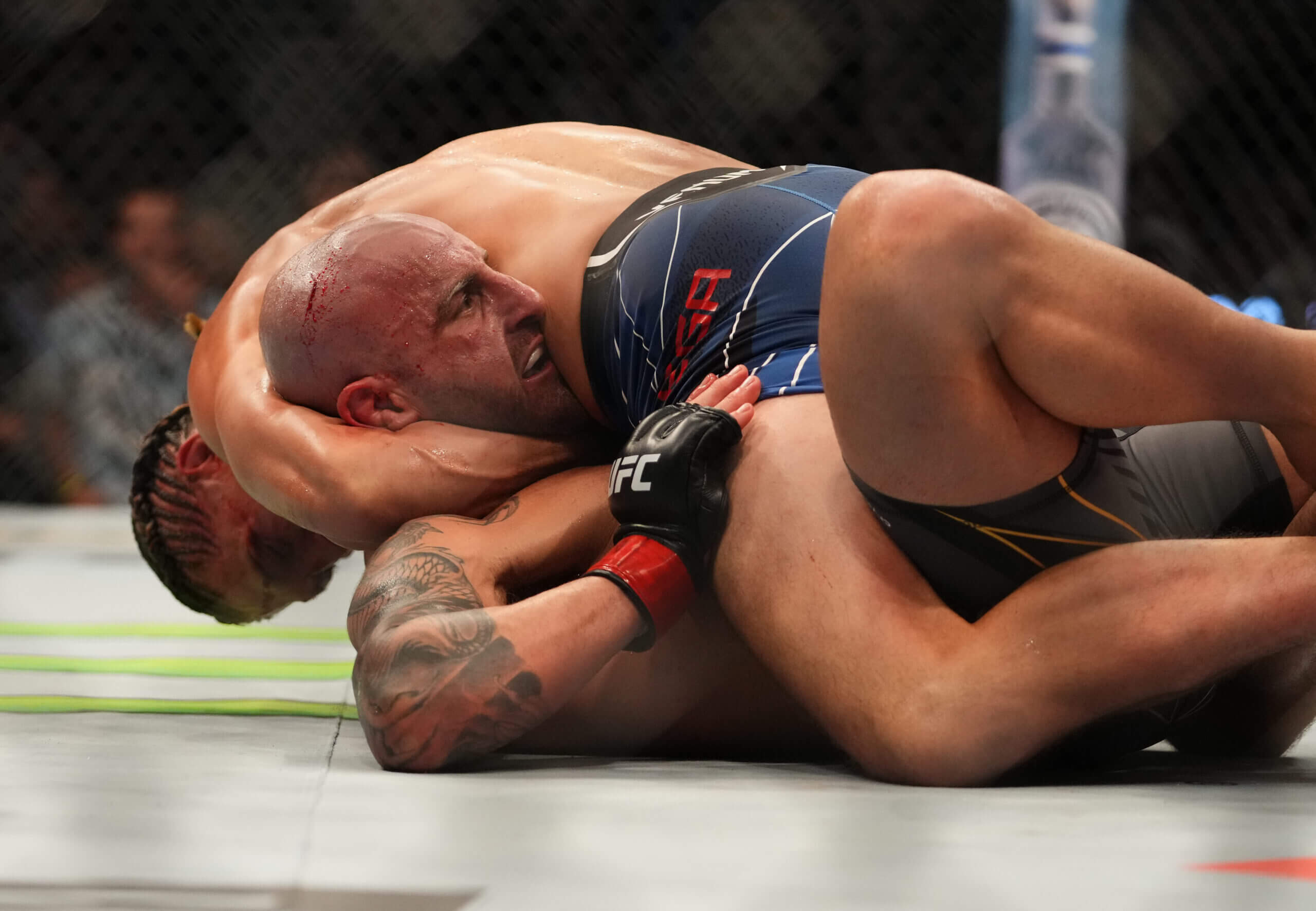
How do you break down the footage after a fight? That match with the current champ Volkanovski was close, that must have been a tough one to process.
I always look for holes in my game. No matter the outcome of the fight, I will analyze what happened. I have people around me who are brutally honest. They will tell me if they think I was doing the right thing or if I fucking sucked. There is always room for improvement when it comes to the fight game. I spent hours and hours watching the film of me and Volkanovski wondering how he got out of that choke. I had him in the guillotine thinking how I was going to be the world champion. I was just waiting for the tap and it never game. There were minor adjustments that I missed. I have been know as a jiu-jitsu guy, and because of that I started to work on other things. That was a mistake I made, because perhaps if I had focused on my main skill. I would be lying to you if I told that it didn’t hurt me to have every fight fan out there reminding me that I was almost the champion. I am the man who has put the champ in the most trouble so far, and he knows that. Do you not think that I sit there and think about that? Trust me I do, I have to live with myself and those moments.
The first loss didn’t come until you had been in a UFC for awhile. How have your learned to deal with a loss and coming back?
It’s gotten a lot better, the first loss that I ever took was really bad. I had to undergo surgery, and I was becoming really depressed. That experience took its toll on me. I let myself get carried away with my recklessness. My instinct was to party too much, and perhaps that’s the Mexican in me, I just tried to drown my sorrows. I would just put a mask on so that the world thought that I was smiling about everything. Deep down inside it wasn’t right inside. I snapped out of it eventually. My right hand Mike Saffaie was texting me every day telling me to come into the gym.
Eventually he convinced me, and all he wanted me to do was stand on a piece of board for balance. It was as simple as that. But as silly as it sounds, it worked, and after not being in the gym for six months I was in there once a week. That just kept building until I was in there most days of the week. I got back into the mindset where I wanted to fight again. That whole period was the toughest I have ever been through, because I was experiencing a lot of things for the first time. That was difficult but I came a long way because of it. I learned how to deal with loss thanks to that first real heartbreak.
Do you have positives that you are able to take from nights when you aren’t able to get the win?
The loss that I had to Alexander Volkanovski was one of the most fun fights I have had ever. The walk out was incredible, and I enjoyed being in the Octagon there. I was in the hospital and I saw a lot of different things. But I was back at it a week later, and moving around, not stuck in a rut like I had before. I kept my chest and my head held high. I have nothing to be ashamed of. I have to give a lot of credit to my girlfriend, who helped me realize that I didn’t need to give a fuck what people thought.
I am okay with a loss if I left everything out on the mat. If I had more in the tank and I quit, that would put me into a depression. But as long as I leave a piece of my soul in every fight, I’m good. My mind is clearer these days and I understand that about myself. So it’s been easier for me to move on towards fixing my body. I get back into showing up at the gym. This is a huge improvement. Last time, after that first loss, I was out of the game for a few years, I wasn’t fighting between 2018 to 2021. The only reason I didn’t jump right back in the Octagon immediately after the Volkanovski was because I had to wait until my orbital to heal from the fracture.
I’ve seen that even when you do lose, you take it to the mat every time and put in work until the end. And you never seem to back down from difficult opponents. It seems like you’re always fighting champions past and present.
I thrive when I put myself in worlds where I am not the best. Even when I am practicing I will have situations where guys are beating up on me for five rounds straight, which you wouldn’t think would be a positive thing for me but it really is. Because that is when I am able to bring it back, and cut those amounts of rounds that I am losing from three to two to one to I’ve got you. There is no doubt that we as human beings have good days and bad days. Being in the fight game, those bad days can be really bad, because the consequence is getting beat up on and losing an important match. My bad days lead to me getting hit in the face.
How has the recovery been since you dislocated your shoulder at the UFC Fight Night in Long Island you were on the main card for?
I just had surgery. Following that, I had a tough bit of road with the treatment and medications where I was put in a bit of a messed-up mental state. I kept to myself right after the fight, because I knew that I would have some bad energy on me and I don’t want to bring it around everyone else. I’ve gotten to dark places before, but I didn’t want to do that this time. I have a few months of recovery, and in the past I would have just sat on the couch and eaten too much. I didn’t want to do that this time.
I was able to snap of it though, and now I’m back to working out every day. I am getting in 45 minutes on the stair master. I am training my legs every day, whether it’s weights or conditioning. I am making sure to get into the sauna every day. I have been enjoying hanging out with my kids, taking them to their soccer practice and playing a little Call of Duty with them. I’m making sure to eat well. I have a private chef who comes over to the house and cooks all of my meals as I need them breakfast, lunch, and dinner. His name is Martin Ortega and he’s my dad. He cooks for me during my fight camps, and now he’s cooking for me during my recovery. This morning it was potatoes with bell peppers beside an omelet made with mushrooms and zucchini.
How is your arm protected during these sessions? Do you have some sort of cast?
My doctor is a surfer like me, and his son invented a different kind of workout sling which is made basically with a surfing leash with a strap that gets wrapped around your ankle. It’s made of wetsuit material so you don’t get a rash wearing it too long. You can sweat and go into the sauna with it, so it’s been my workout sling and my everyday sling.
Do you have any kind of timeline for when you might get back in the Octagon?
Right now I’m thinking about how I want to come back and who I want to fight next. I want to make a statement. I fantasize about getting back in the Octagon. That’s what’s motivating me through this recovery. I can’t help but want to get back in there with Yair; I think we both know that that’s not how things were supposed to go down. I want to make that matchup right. I want to correct the wrongs in my record. I’m on a mission to make some statements. The recovery is going to be five months my doctor says, that’s the baseline. And then I will go from there to start making the plan for the return.
I’m going into the gym to watch T.J. Dillashaw and Juan Archuleta train for their own fights. I will be trying to help them out with the jiu jitsu from outside the mat. That allows me expend my mental energy, and whatever is left of the physical stuff I will work out in the gym. I believe that as long as I’m staying in the facility I won’t lose my touch. Getting to stay locked in mentally, where I’m thinking of strategies on how to get wins, so that I can move that back into my game. In my eyes, the only thing that I can truly control is making myself undeniable in every way, as a fighter and as a competitor.
The Charge will help you move better, think clearer and stay in the game longer. Subscribe to our wellness newsletter today.
